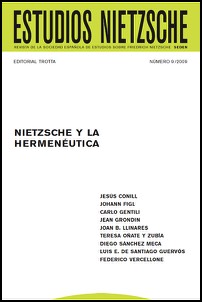Nietzsche y los griegos. Genealogías de la hermenéutica y la postmodernidad hasta nosotros
DOI:
https://doi.org/10.24310/EstudiosNIETen.vi9.10476Keywords:
metafísica, hermenéutica, Grecia, presocráticos, posmodernidadAbstract
El presente trabajo pretende leer a Nietzsche desde Nietzsche, sin las distorsiones usuales
que provoca la interpretación metafísica contra la que dirigió una crítica radical - interpretación
metafísica de muchos tipos: positivista, historicista o nihilista. Con el objetivo de eliminar dichas
distorsiones, examinaremos el Nietzsche griego post-cristiano, que no es otro que el Nietzsche
hermenéutico. Emplearemos tres apartados estratégicos: el yo de Heráclito, el no de Platón y el meta de
Empédocles.
Downloads
Metrics
References
Colli, G., La sabiduría griega, Madrid: Trotta, 1995.
Nietzsche, F., Obras Completas, I-IV (OC ). Director ed. Diego Sánchez Meca. Madrid: Tecnos, 2011-2016
Nietzsche, F., Correspondencia I-VI. (CO). Director ed. Luis E. de Santiago Guervós. Madrid : Trotta, 2005- 2012.
Nietzsche, F., Fragmentos Póstumos I-IV (FP). Director ed. Diego Sánchez Meca. Madrid: Tecnos, 2006-2010.
Downloads
Published
How to Cite
Issue
Section
License
As of issue 21 (2021) this journal is published only in open access (diamond route).
From that number 21, like the previous numbers published in NIETZSCHE STUDIES, they are subject to the Creative Commons Acknowledgment-NoComercia-ShareIgual 4.0 license, the full text of which can be consulted at <http://creativecommons.org/licenses/by-nc-sa/4.0 >
It is the responsibility of the authors to obtain the necessary permissions of the images that are subject to copyright.
This work is licensed under a Creative Commons Attribution-NonCommercial-ShareAlike 4.0 International License.
Copyright generates two different rights: moral rights and patrimonial rights that EJFB recognizes and respects. Moral rights are those relating to the recognition of the authorship. They are rights of a personal nature that are perpetual, inalienable, unseizable and imprescriptible as consequence of the indivisible union of the author and his/her work.
Patrimonial rights are those that can be derived from the reproduction, distribution, adaptation or communication of the work, among others.







11.png)
